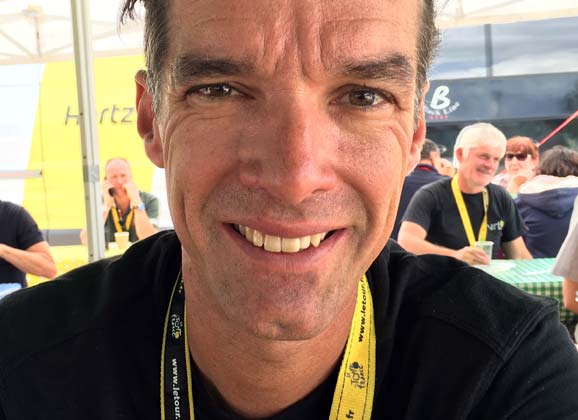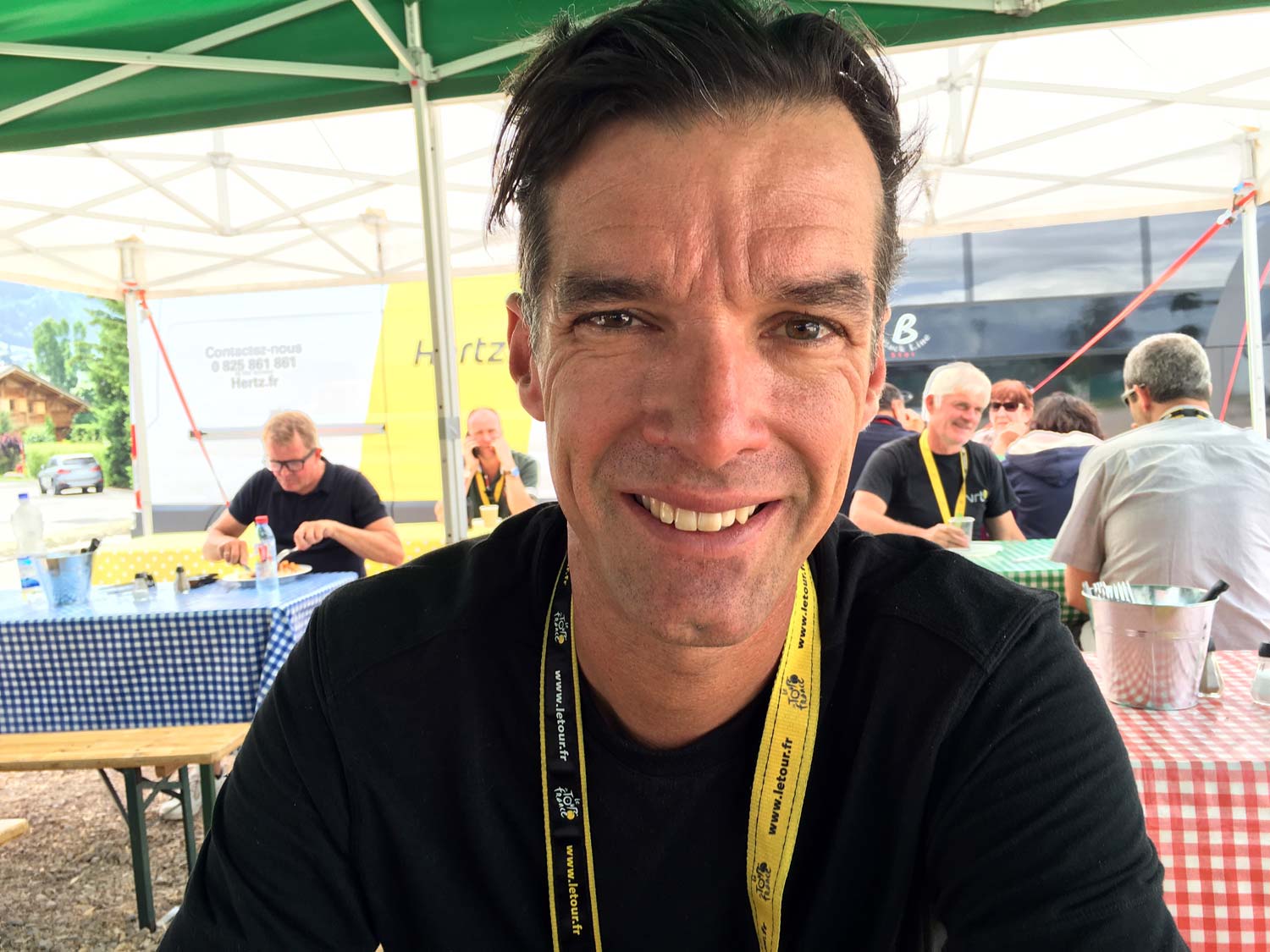[et_pb_section bb_built=”1″ admin_label=”section”][et_pb_row admin_label=”row”][et_pb_column type=”1_4″][et_pb_text admin_label=”Text” background_layout=”light” text_orientation=”left” use_border_color=”off” border_color=”#ffffff” border_style=”solid”]
The change to the British commentary team for the ITV broadcast of the Tour de France in 2016 sparked a lot of discussion… in the opening days. But once viewers realised that the Liggett/Sherwen combo could be swapped over, with David Millar teaming up with Ned Boulting people settled down and got on with watching the action.
[/et_pb_text][/et_pb_column][et_pb_column type=”3_4″][et_pb_text admin_label=”Text” background_layout=”light” text_orientation=”left” use_border_color=”off” border_color=”#ffffff” border_style=”solid”]
For the fourth instalment of the series on cycling commentary we caught up with David Millar from ITV about an hour before he was due to go on air to call the uphill time trial of stage 17.
The co-commentator for the UK broadcasters of the Tour de France needs little introduction; many know Millar from his time on the bike. He’s a stage winner at the Tour and his name is synonymous with a checkered past, one that he doesn’t shy away from… and he certainly has the gift of the gab.
Although he was rushing to the canteen to get lunch and a drink before beginning work for the day, he offered his take on what it’s like being behind the microphone along with Ned Boulting at the 2016 Tour de France.
See the transcript of our chat below…
* * * * *
More on the commentary of commentary
- Part 01: introduction
- Part 02: Rob Hayles interview
- Part 03: Ned Boulting Interview
- Part 04: David Millar interview
* * * * *
RIDE: I’m with David Millar. The other day I spoke with his partner in crime at the Tour de France, Ned Boulting, about the experience of ‘replacing’ Phil and Paul. How are you finding it?
David Millar: “Yeah, good so far. It was a bit daunting at first because obviously I’ve grown up with Phil and Paul as well, when I used to watch bike racing.
“I haven’t watched bike racing since I was a kid, because I’ve been racing, so my memories of watching bike racing was always with Phil and Paul so to come and take that over… it’s like, ‘Oooh, that’s actually quite a big deal.’
“But I’m enjoying it a lot now.”
Just listening to you when you gave interviews after winning stages, for example, you were always very articulate. You were sort of born for the role, is it fair to say that?
“I’ll take it as a compliment.
“But you see, the thing is: I’ve got the easy gig.
“I just have to talk about what I know. Ned has got the actual job – the lead commentary job – which is a difficult one because you’ve got to set the tone and also you have to lead the emotional journey of the viewer. Also you’ve got to be able to cue stuff and know how do links and all that sort of thing, and always be relaying all the information.
“For me, on the other hand, it’s just a case of: I talk about what I see and all the bike racing stuff – it’s what I’ve done all my life.”
And it comes, obviously, pretty natural to you. Do you see it differently now that you’re at the microphone?
“Ah, I do see it differently.
“A lot of my friends didn’t really know bike racing, so I’d say: ‘If you just sit down and we’ll watch the race together sitting on the sofa, I’ll explain it all to you.’
“I’ve always done that and I’ve quite enjoyed explaining the bike race to people in layman’s terms but also while revealing all the intricacies of it. So that’s something I know how to do… and I’m basically just doing that – speaking as though I’m talking to my friends who are sitting on the sofa next to me.
“I see things happening that other people don’t so it’s nice being able to share that.”
Are you getting positive feedback? You’ve got a big Twitter following so people are going to be in touch with you and let you know of their opinion. How has that flow been for you?
“It has been good actually. I suppose that’s one of the good things about Twitter.
“It can be a two-edged sword. Obviously you get bad stuff on Twitter as well but fortunately the feedback has been really positive. That’s nice. And if it’s bad, I’ll just block people. Ha! It’s like, ‘I don’t have to keep you on there…’
“But I can tell you, it’s actually very useful as well because people pick up things that you’re doing that you may not notice. I say, ‘Kind of…’ a lot so. Or say, ‘No’ to answer a question.
“To be honest it’s only little things that other people might not pick up, and it might only be a minority who notice but it can be something that I can pay attention to when otherwise I wouldn’t really notice it.”
You had a little hiatus from cycling but you’ve actually not… you’ve gone from one activity to another but there’s always bike riding involved.
“I stopped racing and went straight to writing my second book (‘The Racer – life on the road as a pro cyclist’) immediately afterwards. So that was quite intense.
“I went straight of racing and into writing.
“That lasted a few months and then I went straight into doing the commentary, so I haven’t really stepped away from it.
“Just when you’re out, they drag you back in – that sort of thing.
“But it’s my life. That’s what I know. It’s not as if I’m going to walk away from that.
“It’s been good and it’s actually nice. I described it to someone the other day saying, ‘It’s like a halfway house…’ it’s better than just being jettisoned out.
“I wanted out but it might have been a bit too much to completely out straight away.
“Now I’m at the race but I’m not in the race, which is quite good – it’s good for me mentally.”
I think it’s also healthy to just have a quick reference to the books you’ve written because ‘Racing through the dark’, I know you wrote; it wasn’t ghost written… can you just clear that up in case anyone has the perception that you just did it with the cooperation of a journalist?
“Well, Jeremy Whittle helped me with it but I wrote it. And ‘The racer’ I wrote completely on my own.
“But, yeah, I totally wrote my books. I’ve written almost 300,000 words for those two books which was then edited down.
“It’s all my own voice which I think is why people liked ‘Racing through the dark’ in particular because there’s a massive difference to the usual.
“Almost all sports biographies – 98 per cent or so are ghost written – and so I always knew that if I was going to do a book I was going to write it myself because that’s the only way it could be authentic and have my voice. And I’m quite proud of that.”
Doing a book is a cathartic experience. It’s probably not always enjoyable but at least you come out the other side knowing a little bit more about yourself. Do you feel that you’re using that in your commentary.
“Yeah, I think so. I mean, obviously, writing a book has allowed me to really dig deep into it all. Maybe ‘The racer’ was more cathartic actually than ‘Racing through the dark’ – because that was more like my fall and rise, if you like.
“‘The racer’ is really just about my love of bike racing. And it was my way of saying goodbye to it. If I didn’t write that straight after I wouldn’t have been able to remember all the minutiae, the emotions and the feelings that were in there. ‘The racer’ has allowed me to explain things so much and I can probably use that as a reference in a few years when I start to forget it.”
– Interview by Rob Arnold
[/et_pb_text][/et_pb_column][/et_pb_row][/et_pb_section]




